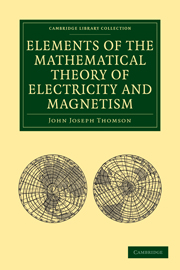Book contents
- Frontmatter
- PREFACE TO FIRST EDITION
- PREFACE TO THE SECOND EDITION
- PREFACE TO THE THIRD EDITION
- PREFACE TO THE FOURTH EDITION
- Contents
- CHAP. I General Principles of Electrostatics
- CHAP. II Lines of Force
- CHAP. III Capacity of Conductors. Condensers
- CHAP. IV Specific Inductive Capacity
- CHAP. V Electrical Images and Inversion
- CHAP. VI Magnetism
- CHAP. VII Terrestrial Magnetism
- CHAP. VIII Magnetic Induction
- CHAP. IX Electric Currents
- CHAP. X Magnetic Force due to Currents
- CHAP. XI Electromagnetic Induction
- CHAP. XII Electrical Units: Dimensions of Electrical Quantities
- CHAP. XIII Dielectric Currents and the Electromagnetic Theory of Light
- CHAP. XIV Thermoelectric Currents
- CHAP. XV The Properties of Moving Electric Charges
- INDEX
CHAP. XIV - Thermoelectric Currents
Published online by Cambridge University Press: 07 September 2010
- Frontmatter
- PREFACE TO FIRST EDITION
- PREFACE TO THE SECOND EDITION
- PREFACE TO THE THIRD EDITION
- PREFACE TO THE FOURTH EDITION
- Contents
- CHAP. I General Principles of Electrostatics
- CHAP. II Lines of Force
- CHAP. III Capacity of Conductors. Condensers
- CHAP. IV Specific Inductive Capacity
- CHAP. V Electrical Images and Inversion
- CHAP. VI Magnetism
- CHAP. VII Terrestrial Magnetism
- CHAP. VIII Magnetic Induction
- CHAP. IX Electric Currents
- CHAP. X Magnetic Force due to Currents
- CHAP. XI Electromagnetic Induction
- CHAP. XII Electrical Units: Dimensions of Electrical Quantities
- CHAP. XIII Dielectric Currents and the Electromagnetic Theory of Light
- CHAP. XIV Thermoelectric Currents
- CHAP. XV The Properties of Moving Electric Charges
- INDEX
Summary
271. Seebeck discovered in 1821 that if in a closed circuit of two metals the two junctions of the metals are at different temperatures, an electric current will flow round the circuit. If, for example, the ends of an iron and of a copper wire are soldered together and one of the junctions is heated, a current of electricity will flow round the circuit; the direction of the current is such that the current flows from the copper to the iron across the hot junction, provided the mean temperature of the junctions is not greater than about 600° Centigrade.
The current flowing through the thermoelectric circuit represents a certain amount of energy, it heats the circuit and may be made to do mechanical work. The question at once arises, what is the source of this energy? A discovery made by Peltier in 1834 gives a clue to the answer to this question. Peltier found that when a current flows across the junction of two metals it gives rise to an absorption or liberation of heat. If it flows across the junction in one direction heat is absorbed, while if it flows in the opposite direction heat is liberated. If the current flows in the same direction as the current at the hot junction in a thermoelectric circuit of the two metals heat is absorbed; if it flows in the same direction as the current at the cold junction of the circuit heat is liberated.
- Type
- Chapter
- Information
- Elements of the Mathematical Theory of Electricity and Magnetism , pp. 506 - 518Publisher: Cambridge University PressPrint publication year: 2009First published in: 1895



